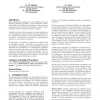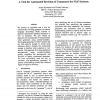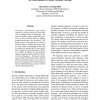92
Voted
LDTA
2010
15 years 1 months ago
2010
Real programming languages are often defined using ambiguous context-free grammars. Some ambiguity is intentional while other ambiguity is accidental. A good grammar development e...
99
Voted
CEC
2010
IEEE
15 years 1 months ago
2010
IEEE
Abstract-- This work furthers the understanding of modularity in grammar-based genetic programming approaches by analyzing how different grammars may be capable of producing the sa...
105
Voted
ANLP
2000
15 years 2 months ago
2000
We present an algorithm and a tool for automatically revising grammars for natural language processing (NLP) systems to disallow specifically identified sentences or sets of sente...
96
Voted
ANLP
2000
15 years 2 months ago
2000
This paper describes a method for estimating conditional probability distributions over the parses of "unification-based" grammars which can utilize auxiliary distributi...
116
Voted
DLT
2003
15 years 2 months ago
2003
Past proposals for applying to pictures or 2D languages the generative grammar approach do not match in our opinion the elegance and descriptive adequacy that made Context Free gr...
87
Voted
ACL
2001
15 years 2 months ago
2001
Current alternatives for language modeling are statistical techniques based on large amounts of training data, and hand-crafted context-free or finite-state grammars that are diff...
83
Voted
ACL
2003
15 years 2 months ago
2003
We introduce a MetaGrammar, which allows us to automatically generate, from a single and compact MetaGrammar hierarchy, parallel Lexical Functional Grammars (LFG) and Tree-Adjoini...
ACL
2006
15 years 2 months ago
2006
We claim that existing specification languages for tree based grammars fail to adequately support identifier managment. We then show that XMG (eXtensible MetaGrammar) provides a s...
104
Voted
EMNLP
2008
15 years 2 months ago
2008
We present a discriminative, latent variable approach to syntactic parsing in which rules exist at multiple scales of refinement. The model is formally a latent variable CRF gramm...
102
Voted
PASTE
2010
ACM
15 years 2 months ago
2010
ACM
Packrat parsing is a powerful parsing algorithm presented by Ford in 2002. Packrat parsers can handle complicated grammars and recursive structures in lexical elements more easily...



